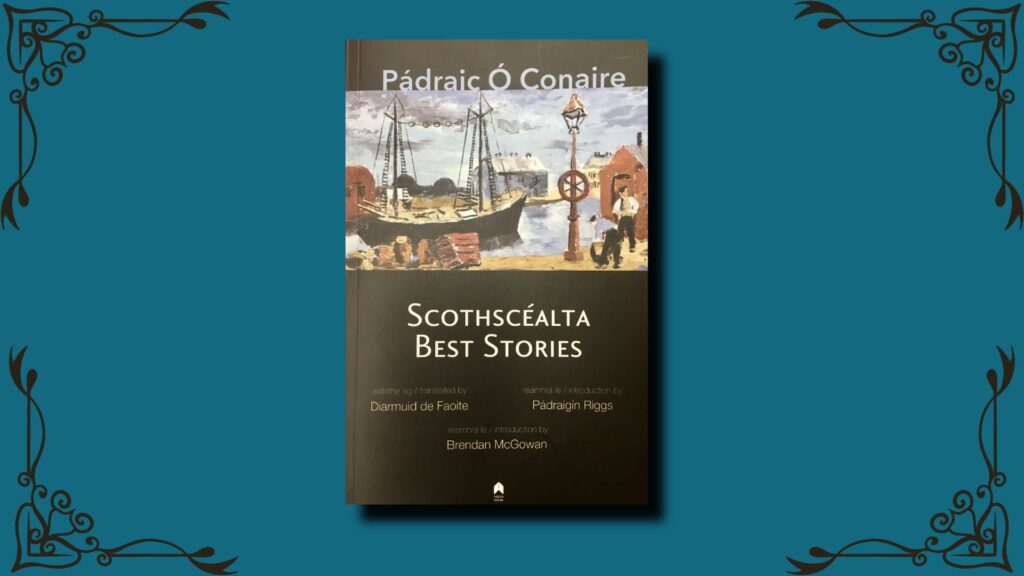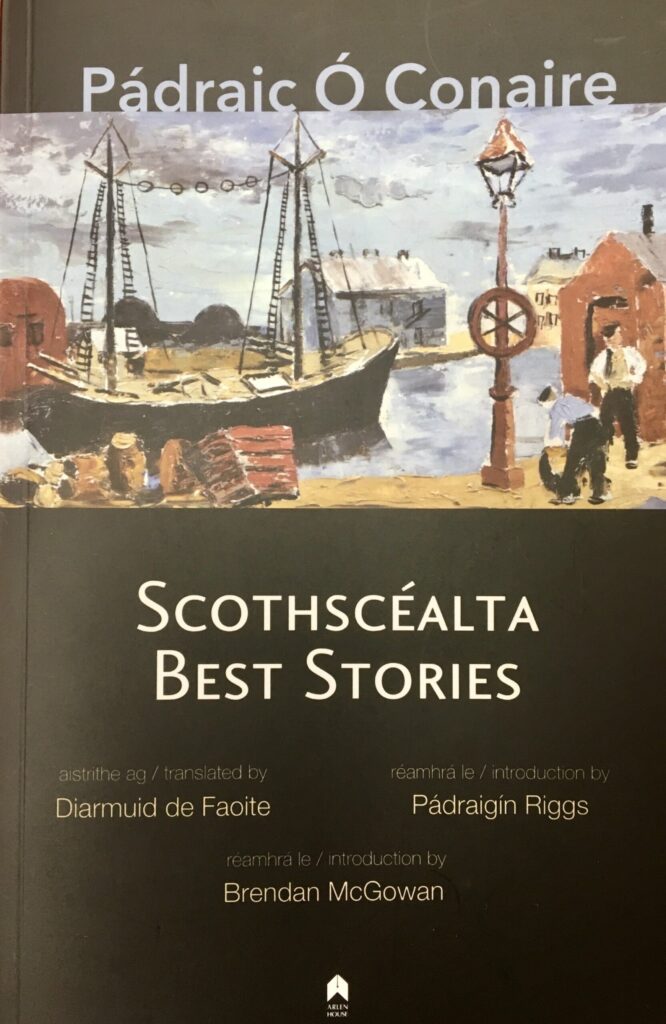
Scothscéalta/Best Stories|Pádraic Ó Conaire|translated by Diarmuid de Faoite|Arlen House
Translated with stylistic unity and authority, this bi-lingual edition of Scothscéalta should entice readers
by Cathal Póirtéir
The tradition of short story writing in Irish goes back well over a hundred years. One of the writers who published widely in the early twentieth century was the Galway man Pádraic ó Conaire (1882-1928), commemorated by the iconic statue in Eyre Square.
A number of his books are still read and have featured on reading lists at second and third levels for many years. These include his novel Deoraíocht (1910) (published in translation as Exile by Cló Iar-Chonnachta in 1994) and Scothscéalta, a collection of his best short stories edited and published by Tomás de Bhaldraithe in 1956.
De Faoite’s latest project to bring the work of Ó Conaire to a wider public is his recently published translation of Scothscéalta
The actor and writer Diarmuid de Faoite has a particular affection for Ó Conaire’s work, as evidenced by his stage show based on the writer’s life and work, and his translation a few years ago of the collection of short stories based around the Easter Rising of 1916, Seacht mBua an Éirí Amach which I reviewed here at the time.
De Faoite’s latest project to bring the work of Ó Conaire to a wider public is his recently published translation of Scothscéalta. This includes useful short introductions by Brendan McGowan and Pádraigín Riggs which supply welcome contextual and biographical information about the writer and his work that is not in the original 1956 publication or its subsequent reprints. It is a bi-lingual book with the stories first given in the original Irish and followed by an English translation. There is also a translator’s note from Diarmuid de Faoite.

McGowan informs us that by 1980 Scothscéalta had sold 50,000 copies, helped no doubt by its inclusion on school and university reading lists. Unfortunately Ó Conaire did not benefit from those new generations of readers, having died in poverty in 1928.
The stories were ground-breaking when originally published
The ten stories that Tomás de Bhaldraithe chose for the collection were all written during the author’s most productive period between 1904 and 1918, most when he was living in London. Several had won prizes in Oireachtas na Gaeilge literary competition and had been published in An Claidheamh Solais, the Conradh na Gaeilge newspaper, edited up to his death by fellow short story writer Pádraic Mac Piarais.
The stories were ground-breaking when originally published; their themes and settings were new to short story writing in Ireland and dealt with the harsh realities of life that Ó Conaire knew only too well: urban and rural poverty, forced emigration, alcoholism, gross inequality for women, unwanted pregnancy, unwanted marriage, marriage difficulties, extra-marital affairs, and mental health to recall some of them.
Many of the stories are about misfortune and heartbreak, often involving women who have been mistreated by men, and by the general disregard of their individual rights
At the time, romantic stories with moral lessons would have been common in short stories, for example those of Padraic Mac Piarais. Ó Conaire, on the other hand, seems to have been influenced by more realistic and socially aware literature being published in mainland Europe, which involved exposing the inner emotions of the main characters as well as reflecting the social mores and economic realities with which they had to contend.
Many of the stories are about misfortune and heartbreak, often involving women who have been mistreated by men, and by the general disregard of their individual rights. Other stories expose slights which are nurtured, to become obsessions leading to acts of revenge. Others have their happy lives disrupted by misfortune, whether that be an individual accident or deep personal loss.
As the stories in the collection are anything up to 120 years old, they certainly cannot be viewed in the same light as we would a contemporary collection but most of them remain impressive, even though their ground-breaking qualities have long since been superseded by more modern and much more daring stores.
It would be an exaggeration to describe them as faultless but some of them are very good indeed. Anyone who reads these stories in translation or in the original should be impressed with how far Ó Conaire goes to reflect aspects of Irish life at the time which were brushed under the carpet by many of his contemporaries. In Scothscéalta/Best Stories the author offers no condemnation or judgement on his main characters whatever their circumstances or faults. What we get instead is a sympathy for them as individuals and their predicament, an understanding of what they have done and why.
Anyone who reads these stories in translation or in the original should be impressed with how far Ó Conaire goes to reflect aspects of Irish life at the time which were brushed under the carpet by many of his contemporaries
To mark the centenary of Pádraic Ó Conaire’s birth in 1982, that great champion of the Irish short story, David Marcus published Padraic O Conaire: 15 short stories (Poolbeg Press) which contained English translations by a variety of writers. The present volume has the notable difference of having being translated by a single writer whose long term attachment to Ó Conaire and his work lends a stylistic unity and an authority to his translations.
Congratulations are due to Diarmuid de Faoite and Arlen House for making these stories available in a bilingual version that should entice readers not already familiar with Padraic ó Conaire, or who wish to revisit stories that they may have read many years ago.

Cathal Póirtéir has specialised in researching, presenting and commissioning Irish interest material in various radio formats and in books, including history, literature and folklore in Irish and English, as well as current affairs and drama.











